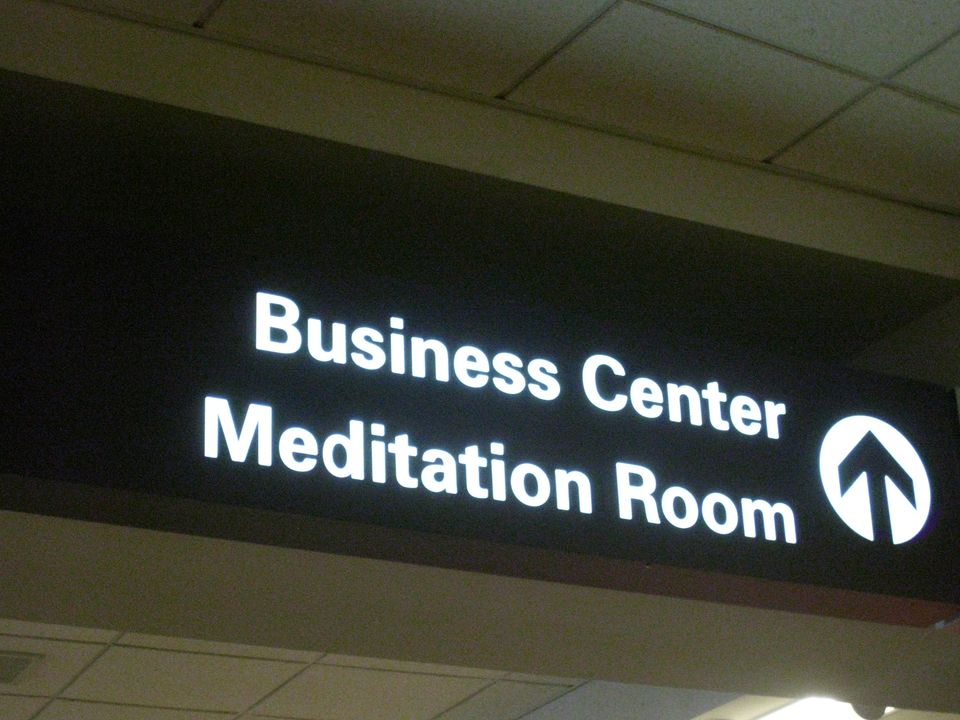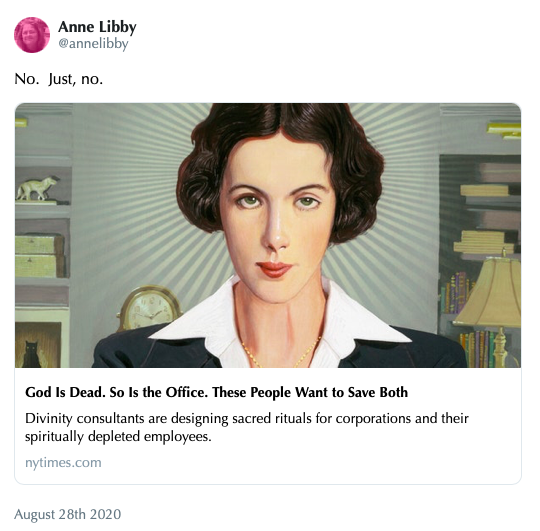Warm Take: Your Job Will Not Save You. August 30, 2020

As a bleeding-edge GenXer, I feel like millennials I see in the workplace have had it tough.
They were assured that education was a debt-worthy investment. Exhorted to learn to code, join a startup, raise a round. Many saw their parents betrayed by organizational life.
They endure persistent messaging that “falling behind” is a personal failure you can’t come back from.
And that when you are driven by a mission, you can’t possibly overwork.
This idea seems like it’s falling apart, right? And yet.
God Is Dead. So Is the Office. These People Want to Save Both describes consultancies started by recent divinity school graduates. They’re advising organizations on creating sacred rituals for the workplace.
My hot take:

(Aside: why would millennials double down on the erosion of the boundary between personal and professional spaces?)
My warm take for today: there’s nothing worse than a for-profit vehicle for spirituality.
As a 20+ year student of meditation and yoga, I would characterize some of my studies as cult-adjacent. Now, cult is a loaded word.
My cult-adjacent travels never led me to surrender my agency. I had no experiences I associate with the term cult: seeing another flawed human as a guru; or being "brainwashed," isolated from loved ones, deprived of sustenance, or having my labor stolen.
That said, I have invested money and time in workshops and classes offered in communities formed around spiritual traditions. Some of these groups were pretty good.
Others turned out to be dodgy.
I imagine that some of the men leading these communities — and they were all led by men — started with good intentions. Some probably just wanted to make a living doing something they were good at.
Sooner or later, some of these dudes just started making $hit up.
Last Sunday, I saw the first episode of an HBO documentary series, The Vow. The series explores a group I had (thankfully) not encountered, Nxivm. Similar to many businesses where I took workshops and classes, Nxivm was a for-profit organization. A privately held company.
The program shows video from Nxivm’s entry level personal development course, the “Executive Success Program.” People looked familiar; they looked like me and my friends.
People searching for stress relief, self-improvement, personal development, and learning. Along the way they found friends and community.
Things got pretty dark at Nxivm.
I spent many mundane weekends at workshops, perfecting a handstand or watching my breath.
Later, I learned that there was more going on that I never saw. (There's one guy out there who I thought was harmless; he wasn't. If I were to run into him today, I'd probably hold myself back from kicking him in the knee.)
Mostly, I mostly view the time and money I invested in these studies as tuition.
Among other things, I learned how to pattern-match bull$hitters.
In addition to their life-changing promises, they wrap themselves in organizations. No oversight, or public examination of their financials. Boards of directors comprised of insiders with financial and other incentives in maintaining the status quo.
This is the plain vanilla privately-held company, with a side order of guru.
I don’t see the (mostly*-millennial) divinity school graduates profiled in the article as BSers.
However, I would ask to see their homework.
- Elaborate on what they learned about cults in Divinity School.
- Consider how spirituality and ritual can be weaponized.
- Interview people who were engaged in “Kabbalah studies” with Adam Neumann in the WeWork offices. Or meditating at Google. Women who worked at Hobby Lobby.
- Explore how organizational in-crowd dynamics might lead people to sign up for things they’re not ready for. (NB: the term “inner circle” comes up in news stories about both cults and startups.)
Margaret Atwood recently wrote about creating The Handmaid’s Tale’s misogynist theocracy.
I made a rule for myself: I would not include anything that human beings had not already done in some other place or time, or for which the technology did not already exist…all had precedents, and many of these were to be found, not in other cultures and religions, but within Western society, and within the “Christian” tradition itself. (I enclose “Christian” in quotation marks, since I believe that much of the Church’s behavior and doctrine during its two-millennia-long existence as a social and political organization would have been abhorrent to the person after whom it is named.)
Margaret Atwood on How She Came to Write The Handmaid’s Tale
I’d also assign them to read, or re-read, The Handmaid’s Tale.
Because I can’t imagine a more direct path to theocracy than convincing workers that their employers are well-qualified to serve their spiritual needs.
The pull quote at the top of the newsletter is from Margaret Atwood on How She Came to Write The Handmaid’s Tale.
Thank you for being a Supporting Member of On Management! And for forgiving my typos in these quickish Sunday morning notes.
I usually have a bunch of themes for the public newsletter rattling around in my head.
An underlying point of today’s newsletter is the importance of personal boundaries. I may well have more to say about mixing spirituality and work.
I’ve circled around this theme when writing about missionwashing, vocational awe, and narratives about success, failure and work.
Yet, I’ve struggled to construct a monthly-ish newsletter with Boundaries as a theme. Who are the subject matter experts, what are the relevant resources, and so forth? If you have ideas or suggestions, I’d love to hear them.
Be well, and may your loved ones be safe, healthy and free.
Anne Libby





